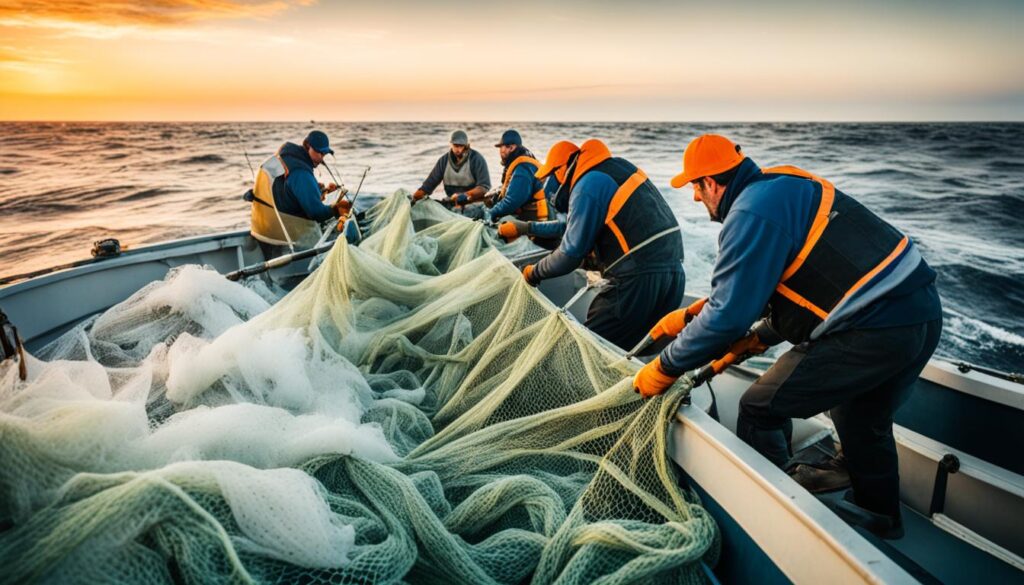The Bible says Jesus chose seven fishermen among his first 12 disciples. He did this on purpose. Jesus saw unique qualities in fishermen, such as their ability to work with others, dedication, and courage. He thought these qualities would help them spread his message well. So, by saying they would be “fishers of men,” Jesus meant they would bring people to know God.
The Symbolic Meaning of “Fishers of Men”
Jesus used the term “fishers of men” when He asked His disciples, Simon, Peter, and Andrew, to join Him. As Jesus strolled along the shores of the Sea of Galilee, he came upon a group of fishermen casting their nets into the water. That’s when Jesus invited them to be “fishers of men.” They immediately left everything to follow Him (Mark 1:16–18; see also Matthew 4:19).
Jesus’ Call to Follow and Make Disciples
When we fish, we need to understand the fish to catch it. This metaphorical language shows what Jesus wanted His disciples to do. He wanted them to spread the gospel and bring people to God like catching fish.
Relating Fishing to Evangelism
Like fishermen who know their fish, the disciples had to learn to share the gospel. They spent time gaining the knowledge they needed, much like job training. This helped them become skilled at their new mission.
The Gospel: The Net that Catches Souls
Fishermen’s nets symbolize something more remarkable. They stand for the Kingdom of God, catching all people for salvation. So, when Jesus called his disciples “fishers of men,” it was about inviting everyone to God’s Kingdom.
Characteristics of Fishermen That Suited Discipleship
Fishermen were perfect for becoming disciples for some good reasons. They were used to following orders without questioning. This is clear from stories where the disciples dropped everything to follow Jesus.
Their openness to listen and obey was vital. It aligned with what was needed for them to be good disciples.
Obedience and Willingness to Take Orders
Looking at the biblical accounts and scriptural references, it’s easy to see that the apostles and disciples of Jesus were obedient and willing to learn from their leader. This attitude was crucial for the role of discipleship.
They were trained to follow orders, which made them fit for the job.
Teamwork and Collaboration
Fishermen worked closely together while fishing, which required a lot of teamwork and the ability to work towards a shared goal. This is similar to the unity and collaboration the disciples needed to spread the gospel.
Being used to working together, they were ready for this new mission.
Dedication and Perseverance
Fishermen were also known for being dedicated and determined, which were crucial qualities. The disciples’ challenges and hardships were tough, but the unwavering commitment of the fishermen-turned-disciples was their strength.
The Significance of Fishermen Disciples: Why Jesus Called Upon Them
The story of Jesus picking fishermen as his first disciples is significant. He chose them from an ordinary job to show that skills and character matter more than social standing. Fishermen were known for being hardworking, team players, and never giving up, which made them a good fit for spreading God’s Kingdom.
They weren’t just fishing for fish anymore. Their purpose had transformed. Now, they were fishing to bring people closer to God. This shift in their mission, from catching fish to catching people for God, profoundly changed their lives. By starting with fishermen, Jesus showed that he can work through anyone. It didn’t matter where they came from.

The Hard-Working Nature of Fishermen
Fishing during Jesus’ time was no easy task; it demanded immense effort and resourcefulness. Fishermen on the Sea of Galilee employed a variety of tools to catch their prey, ranging from nets and baskets to spears and, sometimes, just their bare hands. They pursued fish like must, biny, and sardine, often venturing out at night to avoid the scorching daytime heat and facing the challenges posed by ever-changing weather conditions and competition from fellow fishermen.
Fishing as a Laborious Occupation
Despite the hardships, many fishermen, like Zebedee, achieved remarkable success and established thriving businesses that employed additional workers. This speaks to their astute business understanding and ability to navigate the commercial aspects of fishing. These skills would later prove invaluable when they became disciples of Jesus and embarked on the mission of spreading the gospel.
The Business Savvy of Fishermen
Biblical accounts offer insights into the economic landscape of the first century. They portray fishermen as adept at handling competition and building prosperous enterprises, qualities that would serve them well as they transitioned into roles as disciples of Jesus.
The Commonality of Fishing in Jesus’ Ministry
Fishing occupies a prominent place in the biblical narrative, from the abundance of fish in the seas created by God to stories like Jonah’s ordeal and Jesus miraculously feeding thousands with fish, underscoring the profound significance of these aquatic creatures.
The Prominence of Fish and Fishermen in the Bible
Throughout the Bible, fish and those who catch them feature prominently, weaving into the tapestry of biblical tales and illustrating their enduring importance.
The Sea of Galilee: Center of Jesus’ Ministry
The Sea of Galilee holds special significance in Jesus’ teachings. It serves as the backdrop for pivotal moments in his ministry and provides the setting where he selected his initial followers from among the fishing communities dotting its shores.
The First Disciples’ Backgrounds as Fishermen
Peter, Andrew, James, and John, among the first disciples Jesus chose, were seasoned fishermen who operated within a bustling fishing enterprise owned by Zebedee, James, and John’s father. Their expertise and experience in the fishing trade laid a solid foundation for their future endeavors as messengers of God’s word.
Peter, Andrew, James, and John’s Fishing Business
These early followers of Jesus were integral members of a thriving fishing enterprise, intimately acquainted with the intricacies of the Sea of Galilee and the business realm. Their proficiency in fishing not only sustained their livelihood but also enriched their understanding of the spiritual task entrusted to them.
The Disciples’ Return to Fishing After the Crucifixion
Following Jesus’ resurrection, the disciples returned to their familiar trade of fishing, a testament to their deep-rooted connection to the fishing life. Yet, their encounter with Jesus by the Sea of Galilee served as a poignant reminder of their higher calling, igniting a renewed sense of purpose as they recommitted themselves to spreading God’s love and redemption.

The Metaphorical Link Between Fishing and Discipleship
The connection between the disciples’ former occupation as fishermen and their new calling as “fishers of men” is rich in symbolic depth. Just as fishermen mastered their tools and understood the habits of fish, the disciples diligently learned the craft of making disciples, working tirelessly to spread the gospel, akin to perfecting a craft through apprenticeship.
Learning the Craft of Fishing and Discipleship
Jesus’ metaphor of making the disciples “fishers of men” strongly parallels the two pursuits. Like fishermen needing to possess deep knowledge of their trade to catch fish successfully, the disciples delved into the intricacies of biblical accounts and scriptural meanings. Both endeavors necessitated steady study and skill development.
Jesus Inviting the Disciples Back to Their Calling
When Jesus encountered the disciples after his resurrection and instructed them to catch fish, he symbolically beckoned them to return to their original vocation. This underscored that their calling as “fishers of men” was enduring, emphasizing the profound commitment required to labor for God’s Kingdom.
Biblical Symbolism of Fish and the Kingdom
Fish and fishing carry profound symbolic significance throughout the Bible and early Christian belief. From Genesis, where God fills the seas with life, to various biblical narratives that employ fish and fishermen to convey sacred themes, these motifs hold deep theological meaning.
Fish as a Prominent Symbol in Early Christianity
In early Christian theology, the fish assumes a special significance, as the Greek word for fish (ΙΧΘΥΣ) forms an acronym for “Jesus Christ, Son of God, Savior.” This symbolic connection underscores the profound link between fish and Jesus’s divine nature, making them pivotal symbols in early Christian teachings.
The Net as a Metaphor for the Kingdom of God
Furthermore, a fisherman’s net serves as a potent symbol for the Kingdom of God, intended to gather all people together for salvation. This imagery encapsulates Jesus’s call to his disciples to participate in the growth of God’s Kingdom, likening them to fishers who draw people (“fish”) into the fold.
Cultural and Theological Significance
The selection of fishermen as Jesus’ initial disciples carries immense cultural and theological significance. Jesus recognized in these men attributes beyond their occupation, valuing qualities like diligence, obedience, and teamwork—essential for discipleship and spreading the word.
Conclusion: Embracing a Higher Purpose
The metaphor of fishing for people encapsulates the disciples’ newfound mission as “fishers of men,” demonstrating that anyone, regardless of their past, can serve a higher purpose with Jesus. Fish, fishing, nets, and the Kingdom of God emerge as central symbols in the Bible, enriching the narrative of choosing fishermen as the first disciples.
In Jesus’ time, the backdrop of fishing villages and the teachings of the Hebrew Bible imbued his words with profound significance, magnifying the import of selecting fishermen as his disciples. Their subsequent journey and the growth of Christianity underscore the disciples’ resolute response to Jesus, forsaking their nets to follow him—an act of unwavering faith and obedience.
